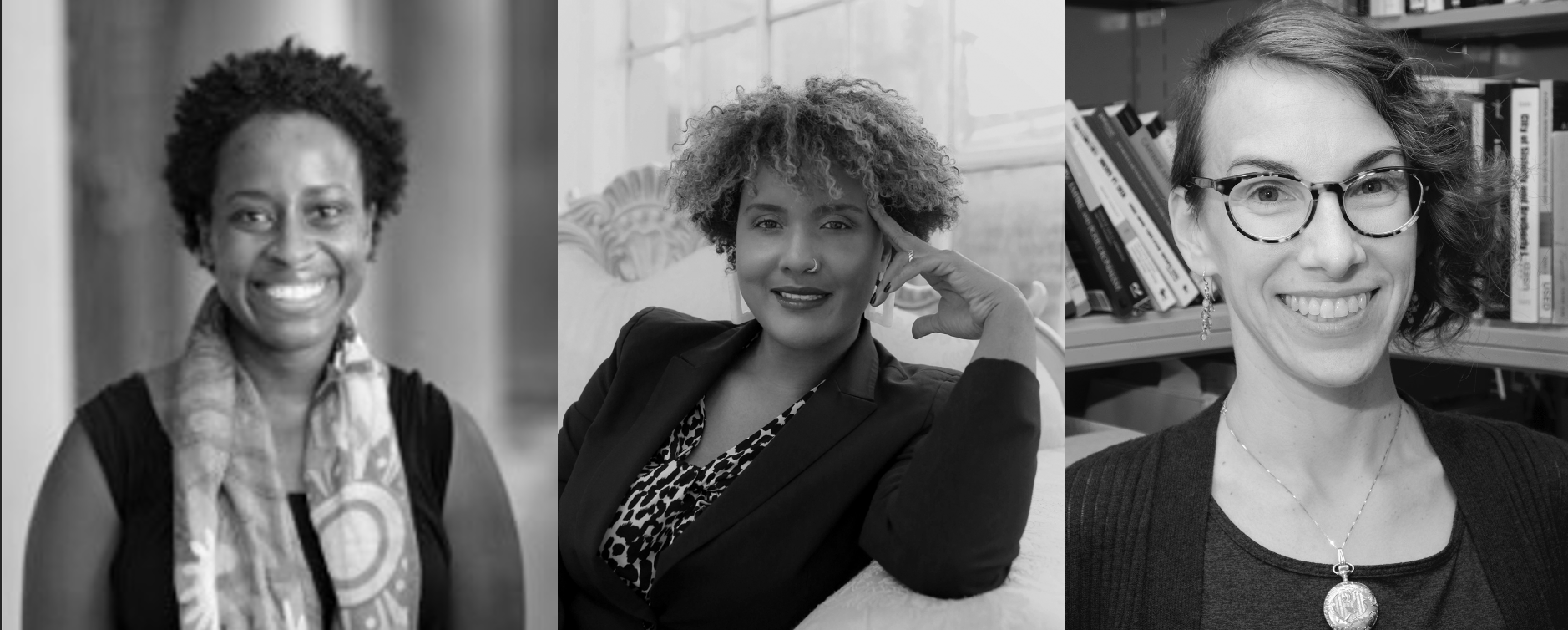
The Politics of Race and Memory in European Society: An Interview with Jean Beaman, Crystal Fleming, and Jennifer Fredette

This is part of our special feature on Race and Racism in Europe: The Urgency of Now.
The recent events sparked by the murder of George Floyd, the disproportionate effect of COVID-19 on minorities, and the Black Lives Matter movement protests in the US appear to have had a major impact on transnational race politics and acted as a catalyst for many European nations to reckon with and scrutinize racism as a domestic structural reality. While it is often suggested that there is a marginalization of race and racism within Europe (and significantly within European Studies), the co-chairs of the CES Race and Racism in Europe Research Network challenge this assertion and choose to instead engage directly with the issues of race and racial stratification in European societies.
In this interview, Jean Beaman from the University of California, Santa Barbara, Crystal Fleming from Stony Brook University, and Jennifer Fredette from Ohio University come together to provide their insights and to contextualize the racial politics of the current moment, to elaborate on how race is a social construct to be interrogated within European society and beyond, and also to highlight the commitment of the research network to foster and support an intellectual community of scholars interested in questions of race and racism.
—Laura Bartley for EuropeNow
EuropeNow How do you understand the mass mobilizations we are seeing at this moment across Europe and the US in reaction to police and state-sponsored violence? How do the dynamics differ in the US versus Europe?
Jean Beaman First, I think it is important to acknowledge that there is a long-standing and on-going anti-racism movement in various European societies that predates the murder of George Floyd. What is fascinating to see in the present moment is how the dual crises of COVID-19 and police violence are converging right now so that we are witnessing a global mass mobilization against racism, unlike what we’ve seen in recent years. For example, in France, where I do research, activists there are making connections between deaths by the police in France, which disproportionately target Black and Maghrebin-origin individuals, and deaths by the police in the US, and how despite various differences between the two societies, justice is not served for these deaths in either case. I also think the lack of a legal civil rights framework in many European societies, in contrast to what we have in the US, explains the difficulties in getting justice for victims of police violence in Europe.
Jennifer Fredette It is very common for people to ask, “Is the US more racist than Europe?” The question is all wrong. What does it mean to speak of degrees of racism? Is there such a thing as a kinder, friendlier anti-Blackness? Clearly not. Instead, our attention should be balanced between the transnational logics of racism (points of convergence, like racial capitalism) and country-specific articulations of racism (points of divergence, like French difference-blindness versus American Jim Crow). And you hear that balance between the transnational and the local in these mass mobilizations. In the Netherlands, for example, recent marches have been accompanied by discussions about the unresolved racial legacy of colonialism (a concern shared by all nations with a colonial history) and zwarte piet (a very Dutch figure).
Crystal Fleming I understand these mobilizations as the continuation of a generations-long struggle to resist anti-black racism and white supremacy in the West. There’s a powerful, unsparing quote from The Wretched of the Earth that has much to teach us about how to think about the dynamics of racism across the Atlantic: “Two centuries ago,” Fanon wrote, “a former European colony decided to catch up with Europe. It succeeded so well that the United States of America became a monster, in which the taints, the sickness and the inhumanity of Europe have grown to appalling dimensions.” I share this Fanonian insight because, far too often, as Jennifer points out, observers emphasize differences in the way racism operates in the United States and Europe without acknowledging the many transnational continuities. Anti-blackness, white supremacy, and colonial oppression are not monopolized by any nation or continent. The historical record reveals that modern racism and European colonial domination were transnational projects from inception. One of the most exciting and inspiring things about current mobilizations of Black Lives Matter uprisings across the globe is the work of Black Europeans and other racially marginalized groups to disrupt this pattern by shining light on racial injustices and racist policing in European nations. We see this in the powerful interventions of leading figures like Assa Traoré, Rokhaya Diallo, Dr. Olivete Otele, Dr. Maboula Soumahoro, and many others.
EuropeNow What are your personal research interests and how does your disciplinary background inform your contribution to the academic literature on race?
Jennifer Fredette My background is in law and society scholarship, and my primary areas of interest are citizenship and rights. This disciplinary background informs my skepticism of formal legal equality and rights as sufficient for guaranteeing full membership in the nation when it comes to Muslims and racial minorities in France.
Jean Beaman I am a sociologist and an ethnographer, which generally means that I study how people make sense of their lives by witnessing and asking them about their lives and their experiences. Specifically, I focus on how populations remain on the margins of society, despite their citizenship status or legal belonging, and I situate race and racism as integral to understanding this in France (as well as globally). I came to these questions of race and racism in France through my experiences learning the French language many, many years ago, as well as a formative year studying abroad in Paris as an undergraduate student. I immersed myself in literature on African-American expatriates to Paris, and years later, when I was in graduate school decided to pursue doctoral research on the experiences of France’s racial and ethnic minorities, or in other words, those individuals who are not white yet are also French. At the time, there was little sociological literature on the topic, and specifically most literature focused on recent migrants to France, versus second and subsequent generation immigrants. My dissertation, and later my first book, focused on the middle-class segment of the North African second-generation, those individuals who were born and raised in France yet born to migrant parents from former French colonies in the Maghreb. I ultimately demonstrate how French identity and societal belonging are situated on whiteness, and that no matter what these minorities do, they are never fully included in French society. By doing so, I contribute to academic literature on race and racial formation by showing how race has tangible consequences even in the absence of official racial and ethnic categories (as dictated by France’s Republican ideology).
Crystal Fleming As a sociologist specializing in the global study of race and ethnicity, my scholarship examines how people of African descent in multiple national contexts interpret and respond to racial oppression. Over the course of my career, the focus of my work has grown from an interest in the anti-racist strategies, group identities, and collective memories of Black populations in the United States and Europe to a broader, more ambitious agenda bridging public sociology with anti-racist scholarship. My current projects draw upon a number of interdisciplinary fields including critical race theory (CRT), Black Feminist Thought, and Black Studies to advance the public’s understanding of racism. I also continue to publish on anti-blackness in Europe and the United States. I see my work as squarely within the anti-racist tradition forged by two trailblazing, iconoclastic public sociologists—W.E.B. Du Bois and Ida B. Wells.
My first book, Resurrecting Slavery (2017, Temple University Press) aims to reshape scholarly conversations about French racism by integrating a critical race perspective. The book foregrounds the concept of white supremacy, which I define as the social, political and economic dominance of people socially defined as white. I argue that clearly identifying white supremacy in France provides a better framework for understanding past and present French racism than other, less specific ways of describing racial conflict. As I argue in my second book, How to Be Less Stupid About Race, one of the most important and revelatory features of CRT is its clear structural analysis of white supremacy as well as the persistence of white dominance in the so-called post–civil rights era—a period in US history when politicians and the majority population increasingly view themselves as “beyond race” or “nonracist.” Through vivid accounts, accessible discussion of empirical data and personal reflections on my own journey from racial ignorance to awareness, the book fosters a structural understanding of white supremacy and equips readers with tools for promoting anti-racist change.
EuropeNow Being currently based in the US, how do you think that informs your perspective on studying race and racial injustice in a European context?
Jennifer Fredette From James Baldwin to Philomena Essed, we have learned that white privilege is maintained, in part, through racial innocence. When unreckoned with, whiteness generates a warped perspective on racial injustice: it looks smaller or even seems to fade from view; and it appears less threatening, less unjustifiable. My perspective on studying race and racial injustice in a European context starts from a desire to better understand, as a white American, race and racial injustice in my own home as well. Precisely because white Americans must unlearn much of what they are explicitly and implicitly taught about race, I find it useful to consider race and racial injustice in a European context because differences in history, presentation, and articulation throw into sharp relief patterns at home, inviting me to consider that which whiteness normally overlooks. In the same way, I think that studying race and racial injustice in a European context as an American provides a bit of critical distance that helps to generate curiosity about those things that whiteness in Europe takes for granted.
Jean Beaman When I first started doing fieldwork in France, I was concerned about not importing American conceptions of race and racism to France, to Europe. However, I quickly realized through multiple conversations with my interlocutors how fungible state boundaries are when it comes to race and racism. I do not mean that there are no nation-state distinctions, but rather that there is a global circulation of ideas of race and racism. For example, American ideas of racial difference were directly influenced by European conceptions. And presently, many of my interlocutors were conversant in a global discourse of race and racism that was not based on the United States per se but was influenced by experiences of being racialized in different societies. As an ethnographer, I think it is crucial to use people’s actual language and discourse on race and racism to fully capture how it manifests in different contexts. I try to stay mindful of this.
Crystal Fleming I think what shapes my own perspective the most is having lived and experienced racialization in multiple societies. I’ve spent over three years living and working in France. But being based in the US now means, concretely, that I have access to more institutional resources and recognition for researching racism than many of my European colleagues—particularly European scholars of color. Racism is of course rampant throughout the US and academia is no exception. White professors and administrators dominate academic institutions and fields Not only does racism persist in academic curricula and research, but institutional racism is also implicated in the underepresentation of Black faculty, Indigenous faculty, and faculty of color. To take but one example, African Americans comprise about 13 percent of the US population but represent only 6 percent of college faculty. Yet, remarkably, this dire situation is even worse in European universities. Kehinde Andrews, one of the leading scholars of Black Studies in the UK, put it this way:
There are few problems of racism that manifest worse in the UK than the US, but the absence of Black voices from the academy is one of them. There is a crisis of representation with only 1 percent of academic staff in Britain being Black. The problem is even worse in the higher levels of the profession where there are only 60 Black full professors across all subjects in the entire country.
EuropeNow As co-chairs of the CES Race and Racism in Europe Research Network, what does the facilitation of this look like? What is the vision and ambition of the Research Network (RN)?
Jean Beaman We are excited about the formation of this new RN as a way to bring together and build an intellectual community around scholars interested in questions of race and racism. Oftentimes, such scholarship is framed as work on migration or class or socioeconomic marginality, but as many scholars have shown us, race and racism are central to the construction of Europe as we now understand it. It is therefore crucial to have an RN focused on such questions. At the 2019 CES conference, our roundtable on this potential RN had a packed room, which among other things, speaks to the necessity of such an established community. We hope to encourage scholars across disciplines and methodologies to engage with each other on these important questions. As this is a new RN, we are also open to ideas and feedback about the future direction of this RN.
Crystal Fleming As co-chairs, I think we would all like to see the Race and Racism research network support the development scholarly work—and debates—on racialization, racial inequality, and anti-racism in Europe given the relative lack of institutional recognition of racism in European politics and society (including academia). I first proposed the establishment of this RN two years ago—in 2018—in the context of a mini-symposium organized by Paul Mepschen and Sindre Bangstad for the annual meeting in Chicago. Entitled “The Recurrent Return of Racisms in Europe,” the full-day event included three panels and about fifteen scholars of race and racism in Europe. During and after the symposium, I worked alongside other scholars of racism in Europe, most notably, Jean and Jennifer, to begin building support for the network and identify scholars who wanted to be involved. These initial efforts culminated in the standing room only roundtable at CES Madrid that Jean mentioned. Overall, my sense is that the response has been quite positive. Nevertheless, I think it’s quite telling (and damning) that it took this long to both articulate the need for the RN and mobilize sufficient support. European nations clearly played a central role in creating and institutionalizing modern racism. Why, then, did we have to wait until 2020 for CES to formally recognize this indisputable historical fact?
Jennifer Fredette In addition to all the intellectual ambitions for the Race and Racism Research Network, I also hope we can generate a supportive space that is characterized by mutual respect and connection. I always tell my students that “we learn better together,” but the ironic thing about academia is that we could sometimes do better at learning together. It is not by accident that imposter syndrome runs rampant in our profession, or that it particularly tends to affect those who are underrepresented in academia. I hope that our Research Network will be a place to buck those trends, where members feel comfortable providing and taking feedback as part of a collaborative process in which, we all become better scholars and sharper thinkers.
EuropeNow Much of the contemporary conversation centers on this idea of the “politics of memory” and commemoration in Europe, particularly as it relates to cultural monuments and statues. What impact do you think this is having on contemporary and historic understandings of racism and colonial legacies?
Jean Beaman Part of the issue with discussing questions of race and racism in Europe is that, frankly, Europe has not addressed or even acknowledged in some cases, the depth of its colonial history and legacies thereof. I think the current toppling of statues such as Colston or Leopold reflects people trying to reckon with the ugly implications of Europe’s colonial project.
Crystal Fleming My first book examined issues of collective memory and the politics of commemorating (and recognizing) the intertwined histories of slavery and colonialism in France. As statues and monuments are increasingly being challenged and even toppled, we’re witnessing a deep and escalating reckoning with symbols and legacies on both sides of the Atlantic. The fact of the matter is that colonial domination and the exploitation of racialized minorities continues to be celebrated, both implicitly and explicitly, in Western societies. White supremacist racism is sustained, in part, by misrepresenting history in ways that glorify colonial violence. Critiquing colonialism is still very much taboo in many Western nations—including the United States. Black Lives Matter movements and other anti-racist uprisings are about contesting racist depictions of the past (and the present) that devalue, stigmatize and disadvantage not only Black people, but also Indigenous populations and other racially marginalized groups.
Jennifer Fredette When Martinicans splash the statue of Joséphine Bonaparte in La Savane with blood-red paint, or deface a statue of Victor Schœlcher, they’re not simply demanding France teach or commemorate European history differently. It’s also a denunciation of contemporary inequalities on the island (such as economic and health disparities with continental France). The politics of memory is never just about the past; it calls for those in power to heed how present injustices are made possible by the refusal to reckon with past injustices.
EuropeNow What are the main challenges you’ve encountered in doing this kind of work?
Jean Beaman As an American, specifically as a Black American, I am continually accused of importing American concepts of race and racism to the French context, and seeing racism everywhere because I am a Black scholar (this is a challenge many Black scholars who work on race and racism face).
Crystal Fleming It is a difficult thing to research and study racism as a Black woman. These issues are not merely academic to me. As someone who is racialized as Black, I both examine and experience anti-Blackness. As a Black woman, I also experience what Moya Bailey refers to as “misogynoir”—the intersection of racism and misogyny. Nevertheless, I would say that I also experience an incredible degree of scholarly and public support for my work and, as mentioned earlier, this would not be the case if I lived and worked in Europe. There are academic positions, degree programs, fellowships, scholarly journals, professional organizations, conferences and yes, research networks, that facilitate and support work like mine in the United States. These institutional sources of recognition were (and are) made possible due to generations of activism (including student uprisings) which have created space for scholarship and pedagogy on race and racism. And, as an African American with ties to elite universities, I had had access to many resources and privileges that are systematically denied to Europeans of color who aspire to enter academia.
EuropeNow How do you think the contemporary moment will have an impact on the future direction of the academic study of race, if at all?
Crystal Fleming The contemporary moment contains a multitude of things—global antiracist movements, the ongoing COVID-19 pandemic, worldwide economic precarity, the accelerating pace of climate change, and the devastating consequences of environmental racism. In many ways, we have never been more connected as a species than we are now. My sense is that rising attention to race and racism across the world will continue to inspire both scholarship and social activism. My hope is that our RN will, in some modest way, contribute to this ongoing, intergenerational work.
Jennifer Fredette Here’s hoping this is the moment, finally, when scholarship on race in Europe is no longer presumed to be about immigration!
Jean Beaman I agree with Jennifer—I hope this means people will start to take race and racism seriously as worthy of inquiry in their own right, and not as related to immigration or class or some other variable.
Jean Beaman is an Associate Professor of Sociology at the University of California, Santa Barbara. She was previously on the faculty at Purdue University and has held visiting fellowships at Duke University and the European University Institute (Florence, Italy). Her research is ethnographic in nature and focuses on race/ethnicity, racism, international migration, and state-sponsored violence in both France and the United States.
Crystal Fleming is a Professor of Sociology and Africana Studies at SUNY Stony Brook. Her passion for speaking truth to power and promoting social transformation infuses her scholarship, writing and teaching. She earned a Ph.D. and a master’s degree in Sociology from Harvard University and graduated with honors in Sociology and French from Wellesley College. Her current projects extend her work on racism and anti-racism by further exploring the dynamics of global white supremacy and anti-blackness in France and the United States.
Jennifer Fredette is an Associate Professor of Political Science at Ohio University. She earned her Ph.D. from the University of Washington, where she also obtained a certificate in Socio-Legal Studies. She studied Comparative Federalism at Sciences-Po Paris in 2006 and worked as a visiting research fellow at Sciences Po Bordeaux in 2008. Her areas of interest include constitutional law, comparative law, and sociolegal studies. She is currently conducting research on law and social movements in the French Caribbean.
Laura Bartley is a CES Digital fellow where she supports virtual networking and professional development. She recently completed an International Master’s degree in Security, Intelligence and Strategic Studies at the University of Glasgow, Dublin City University and Charles University Prague. Holding a BA in International Relations from Dublin City University and a Certificate in International Affairs and Strategy from SciencesPo her research interests include international security, tech and migration policy.
Published on December 8, 2020.




